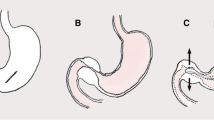Abstract
Pyloromyotomy as described by Weber and Ramstedt has been the standard therapy for infantile hypertrophic pyloric stenosis since the 1960’s and conservative therapy has been abandoned. The objective of this study was to test the effectiveness of systemic atropine applied intravenously for 7 days as a conservative therapeutic strategy and as an alternative to primary operation. Forty-two consecutive term infants with infantile hypertrophic pyloric stenosis were enrolled in the study over a period of 5 years. After confirmation of the diagnosis they all received intravenous atropine at a dose of 0.04 mg/(kg day) and increased by 0.01 mg/(kg day) up to 0.12 mg/(kg day), given as 6–8 single doses per/day. Nine pairs of parents requested that their child should be operated before completing the 7 days of medical therapy. Surgery was necessary in 8 of the remaining 33 infants (24,.2%) who did not improve after 7 days of conservative treatment. Successful treatment with i.v. atropine sulfate was achieved only in 25/33 term infants at an average maximal dose of 0.11 mg/(kg day), without any major side effects. Intravenous atropine sulfate has been considered as a potential alternative therapeutic strategy in the treatment of infantile hypertrophic pyloric stenosis. Clinical improvement however was often not seen before the 6th or 7th day of intravenous treatment. A success rate for the conservative approach of only 75% at day 7 in our study does not favour atropine therapy, in view of success rates above 95% with surgical repair.
Similar content being viewed by others
References
Langer JC, Berezin I, Daniel EE (1995) Hypertrophic pyloric stenosis: ultrastructural abnormalities of enteric nerves and the interstitial cells of Cajal. J Pediatr Surg 30:1535–1543
Okazaki T, Yamataka A, Fujiwara T, Nishiye H, Fujimoto T, Miyano T (1994) Abnormal distribution of nerve terminals in infantile hypertrophic pyloric stenosis. J Pediatr Surg 29:655–658
Vanderwinden JM, Mailleux P, Schiffmann SN, Vanderhaeghen JJ, De Laet MH (1992) Nitric oxide synthase activity in infantile hypertrophic pyloric stenosis. N Eng J Med 327:511–515
Omura N, Kashiwagi H, Aoki T (1993) Changes in gastric hormones associated with gastric outlet obstruction. An experimental study in rats. Scand J Gastroenterol 28:568–572
Mitchell LE, Risch N (1993) The genetics of infantile hypertrophic pyloric stenosis. A reanalysis. Am J Dis Child 147:1203–1211
Cooper WO, Griffin MR, Arbogast P, Hickson GB, Gautam S, Ray WA (2002) Very early exposure to erythromycin and infantile hypertrophic pyloric stenosis. Arch Pediatr Adolesc Med 156:647–650
Hussain N, Herson VC (2002) Erythromycin use during pregnancy in relation to pyloric stenosis. Am J Obstet Gynecol 187:821–822
Hauben M, Amsden GW (2002) The association of erythromycin and infantile hypertrophic pyloric stenosis: causal or coincidental? Drug Saf 25:929–942
Sorensen HT., Norgard B, Pedersen L, Larsen H, Johnsen SP (2002) Maternal smoking and risk of hypertrophic infantile pyloric stenosis: 10 year population based cohort study. BMJ 325:1011–1012
Dufur H, Fredet P (1908) La sténose hypertrophique du pylore chez le nourrisson et son traitement chir surgical. Rev Chir 37:208
Fredet P (1908) Sténose du pylore chez le nourrisson. Résultat anatomique de la pyloromyotomie sur un cas traité et guéri depuis 3 mois. Bull Mem Soc Nat de Chir 54:1050
Ramstedt C (1912) Zur Operation der angeborenen Pylorusstenose. Med Klinik 8:1702
Jacoby NM (1962) Pyloric sStenosis: sSelective Mmedical and Ssurgical tTreatment. A survey of sixteen years experience. The Lancet 1:119–121
Nagita A, Yamaguchi J, Amemoto K, Yoden A, Yamazaki T, Mino M (1996) Management and ultrasonographic appearance of infantile hypertrophic pyloric stenosis with intravenous atropine sulfate. J Pediatr Gastroenterol Nutr 23:172–177
Theobald I, Rohrschneider WK, Meissner PE, Zieger B, Nützenadel W, Löffler W, Tröger J (2001) Hypertrophic pyloric stenosis: sonographic monitoring of conservative therapy with intravenous atropine sulfate. Ultraschall Med 21:170–175
Rohrschneider WK, Mittnacht H, Darge K, Tröger J (1998) Pyloric muscle in asymptomatic infants: sonographic evaluation and discrimination from idiopathic hypertrophic pyloric stenosis. Pediatr Radiol 28:429–434
Honein MA, Paulozzi LJ, Himelright IM, Lee B, Cragan JD, Patterson L, Correa A, Hall S, Erickson JD (1999) Infantile hypertrophic pyloric stenosis after pertussis prophylaxis with erythromycin: a case review and cohort study. Lancet 354:2101–2105
Kawahara H, Imura K, Nishikawa M, Yagi M, Kubota A (2002) Intravenous atropine treatment in infantile hypertrophic pyloric stenosis. Arch Dis Child 63:1060–1064
Yamataka A, Tsukada K, Yokoyama-Laws Y, Murata M, Lane GJ, Osawa M, Fujimoto T, Miyano T (2000) Pyloromyotomy versus atropine sulfate for infantile hypertrophic pyloric stenosis. J Pediatr Surg 35:338–341
Singh UK, Kumar R, Suman S (2001) Successful management of infantile hypertrophic pyloric stenosis with atropine sulfate. Indian Pediatr 38:1099–1105
Kawahara H, Takama Y, Yoshida H, Nakai H, Okuyama H, Kubota A, Yoshimura N, Ida S, Okada A (2005) Medical treatment of infantile hypertrophic pyloric stenosis: should we always slice the “olive”? J Pediatr Surg 40:1848–1851
Corner BD (1955) Hypertrophic pyloric stenosis in infancy treated with methyl scopolamine nitrate. Arch Dis Child 30:377–386
White JS, Clements WD, Heggarty P, Sidhu S, Mackle E, Stirling I (2003) Treatment of infantile hypertrophic pyloric stenosis in a district general hospital: a review of 160 cases. J Pediatr Surg 38:1333–1336
Author information
Authors and Affiliations
Corresponding author
Rights and permissions
About this article
Cite this article
Meissner, P.E., Engelmann, G., Troeger, J. et al. Conservative treatment of infantile hypertrophic pyloric stenosis with intravenous atropine sulfate does not replace pyloromyotomy. Pediatr Surg Int 22, 1021–1024 (2006). https://doi.org/10.1007/s00383-006-1751-3
Accepted:
Published:
Issue Date:
DOI: https://doi.org/10.1007/s00383-006-1751-3




